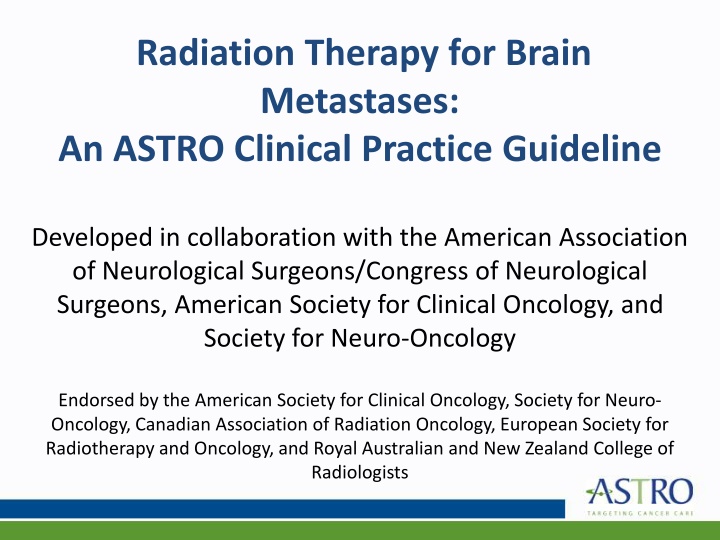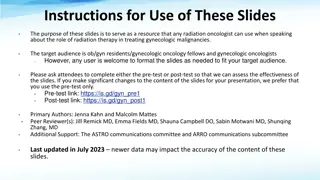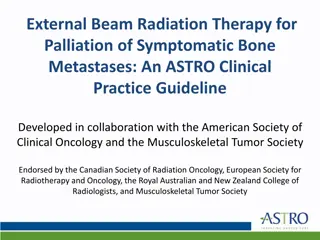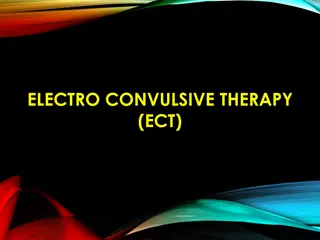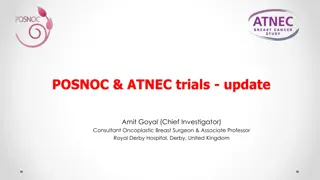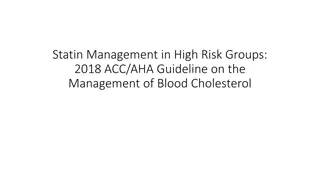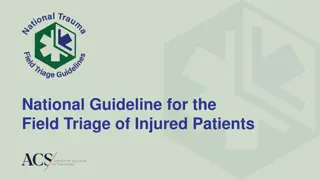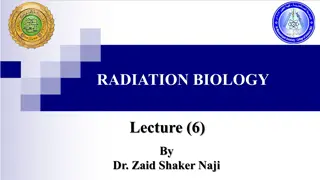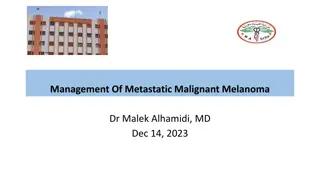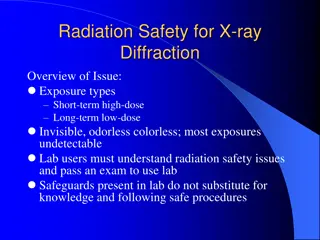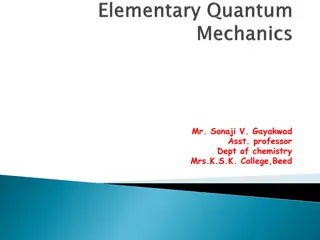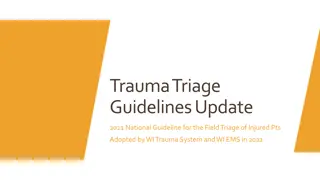Radiation Therapy for Brain Metastases: ASTRO Clinical Practice Guideline
This guideline, developed by a multidisciplinary task force, offers recommendations on the radiotherapeutic management of intact and resected brain metastases from non-hematologic solid tumors. It provides insights into modern radiotherapy strategies like single-fraction and fractionated stereotactic radiosurgery (SRS) and hippocampal avoidance whole brain radiation therapy (HA-WBRT). Clinical considerations for selecting the optimal radiotherapy strategy or deferring treatment in favor of supportive care are also discussed.
Download Presentation

Please find below an Image/Link to download the presentation.
The content on the website is provided AS IS for your information and personal use only. It may not be sold, licensed, or shared on other websites without obtaining consent from the author.If you encounter any issues during the download, it is possible that the publisher has removed the file from their server.
You are allowed to download the files provided on this website for personal or commercial use, subject to the condition that they are used lawfully. All files are the property of their respective owners.
The content on the website is provided AS IS for your information and personal use only. It may not be sold, licensed, or shared on other websites without obtaining consent from the author.
E N D
Presentation Transcript
Radiation Therapy for Brain Metastases: An ASTRO Clinical Practice Guideline Developed in collaboration with the American Association of Neurological Surgeons/Congress of Neurological Surgeons, American Society for Clinical Oncology, and Society for Neuro-Oncology Endorsed by the American Society for Clinical Oncology, Society for Neuro- Oncology, Canadian Association of Radiation Oncology, European Society for Radiotherapy and Oncology, and Royal Australian and New Zealand College of Radiologists
Citation This slide set is adapted from the Radiation Therapy for Brain Metastases Guideline to be published in the July/August 2022 issue of Practical Radiation Oncology (PRO) Web posted link: https://www.practicalradonc.org/ The full-text guideline is also available on the ASTRO Web site: www.astro.org
Guideline Task Force Chairs Paul Brown, MD Vinai Gondi, MD Members Glenn Bauman, MD Lisa Bradfield Stuart Burri, MD Alvin Cabrera, MD Danielle Cunningham, MD Bree Eaton, MD Jona Hattangadi Gluth, MD Michelle M. Kim, MD Rupesh Kotecha, MD Lianne Kraemer Jing Li, MD, PhD Seema Nagpal, MD Chad Rusthoven, MD John Suh, MD Wolfgang Tom , PhD Tony Wang, MD Alexandra Zimmer, MD Mateo Ziu, MD
Task Force Composition Radiation oncologist Drawn from academic, private, and community practices Includes a RO resident and a member of the Guidelines Subcommittee Related specialties* Medical oncologist Neurosurgical oncologist Medical physicist Patient representative *Representatives nominated by specialty societies.
Introduction to Guideline Brain mets develop in 20%-40% of cancer patients Significant impact on cognitive function, neurologic symptoms, and survival Evolving treatment approach Stereotactic radiosurgery (SRS) Hippocampal avoidance whole brain radiation therapy (HA-WBRT) Utilization systemic therapies Selective use of WBRT
Guideline Scope To provide recommendations on the radiotherapeutic management of intact (i.e., unresected) and resected brain metastases from non-hematologic solid tumors. Guidance is provided on the reasonable use of modern RT strategies, including single-fraction and fractionated (i.e., hypofractionated SRS) SRS and HA-WBRT, and discusses clinical considerations in selecting the optimal RT strategy or in deferring RT in favor of best supportive care or close neuro-oncologic surveillance
AHRQ Systematic Review Guideline based on Agency for Healthcare Research and Quality (AHRQ) systematic review, commissioned and funded by the Patient-Centered Outcomes Research Institute (PCORI), included studies from 1990 through July 2020. See the published manuscript for details: https://www.practicalradonc.org/article/S1879-8500(21)00109-0/fulltext Population: Adults with brain metastases Intervention: WBRT and SRS alone or in combination, as initial or postoperative treatment, with or without systemic therapy Comparator: Studies comparing eligible interventions (SRS, WBRT, HA-WBRT) Outcomes: Intracranial control, PFS, OS, neurocognitive function and patient- reported outcomes 9265 citations screened 1520 full-text articles assessed 97 studies included (reported in 190 publications) In addition, the Task force evaluated study outcomes (eg, neurocognitive function, QoL) that were part of the systematic review but were excluded by AHRQ s methodology.
Rating Strength of Recommendation ASTRO s recommendations are based on evaluation of multiple factors including the quality of evidence (QoE) and panel consensus, which among other considerations inform the strength of recommendation. QoE is based on the body of evidence available for a particular key question and includes consideration of number of studies, study design, adequacy of sample sizes, consistency of findings across studies, and generalizability of samples, settings, and treatments. Strength of Recommendation Overall QoE Grade Recommendation Wording Definition Benefits clearly outweigh risks and burden, or risks and burden clearly outweigh benefits. All or almost all informed people would make the recommended choice. Any (usually high, moderate, or expert opinion) Recommend/ Should Strong Benefits are finely balanced with risks and burden or appreciable uncertainty exists about the magnitude of benefits and risks. Most informed people would choose the recommended course of action, but a substantial number would not. A shared decision-making approach regarding patient values and preferences is particularly important. Any (usually moderate, low, or expert opinion) Conditionally Recommend Conditional
Rating Quality of Evidence Overall QoE Grade Type/Quality of Study Evidence Interpretation 2 or more well-conducted and highly-generalizable RCTs or meta-analyses of such trials. The true effect is very likely to lie close to the estimate of the effect based on the body of evidence. High 1 well-conducted and highly-generalizable RCT or a meta- analysis of such trials OR 2 or more RCTs with some weaknesses of procedure or generalizability OR 2 or more strong observational studies with consistent findings. 1 RCT with some weaknesses of procedure or generalizability OR 1 or more RCTs with serious deficiencies of procedure or generalizability or extremely small sample sizes OR 2 or more observational studies with inconsistent findings, small sample sizes, or other problems that potentially confound interpretation of data. Consensus of the panel based on clinical judgement and experience, due to absence of evidence or limitations in evidence. The true effect is likely to be close to the estimate of the effect based on the body of evidence, but it is possible that it is substantially different. Moderate The true effect may be substantially different from the estimate of the effect. There is a risk that future research may significantly alter the estimate of the effect size or the interpretation of the results. Low Strong consensus ( 90%) of the panel guides the recommendation despite insufficient evidence to discern the true magnitude and direction of the net effect. Further research may better inform the topic. Expert Opinion
Consensus Methodology Modified Delphi approach Task force members rated their level of agreement for each recommendation via consensus survey - 5-point Likert scale from strongly disagree to strongly agree - Consensus defined using pre-specified threshold of 75% ( 90% for expert opinion recommendations) agreement Recommendations for which consensus is not achieved are removed or are revised and then re-surveyed. Recommendations achieving consensus edited with substantive changes after the first round are also re- surveyed.
KQ 1: What are the indications for SRS alone for patients with intact brain metastases?
KQ 1: What are the indications for SRS alone for patients with intact brain metastases? Strength of Recommendation Quality of Evidence KQ1 Recommendations 1. For patients with an ECOG performance status of 0 to 2 and up to 4 intact brain metastases, SRS is recommended. 2.For patients with an ECOG performance status of 0 to 2 and 5 to 10 intact brain metastases, SRS is conditionally recommended. 3. For patients with intact brain metastases measuring <2 cm in diameter, single-fraction SRS with a dose of 2000 to 2400 cGy is recommended. Strong High Conditional Low Strong Moderate Implementation remark: If multifraction SRS were chosen (eg, V12Gy >10 cm3 [see KQ4]), options include 2700 cGy in 3 fractions or 3000 cGy in 5 fractions.
KQ 1: What are the indications for SRS alone for patients with intact brain metastases? (con t) Strength of Recommendation Quality of Evidence KQ1 Recommendations 4. For patients with intact brain metastases measuring 2 cm to <3 cm in diameter, single-fraction SRS using 1800 cGy or multifraction SRS (eg, 2700 cGy in 3 fractions or 3000 cGy in 5 fractions) is conditionally recommended. (see KQ4) 5. For patients with intact brain metastases measuring 3 cm to 4 cm in diameter, multifraction SRS (eg, 2700 cGy in 3 fractions or 3000 cGy in 5 fractions) is conditionally recommended. Conditional Low Implementation remarks: If single-fraction SRS were chosen, doses up to 1500 cGy may be used. (see KQ4) Multidisciplinary discussion with neurosurgery to consider surgical resection is suggested for all tumors causing mass effect, irrespective of tumor size. Conditional Low
KQ 1: What are the indications for SRS alone for patients with intact brain metastases? (con t) Strength of Recommendation Quality of Evidence KQ1 Recommendations 6. For patients with intact brain metastases measuring >4 cm in diameter, surgery is conditionally recommended, and if not feasible, multifraction SRS is preferred over single-fraction SRS. Conditional Low Implementation remark: Given limited evidence, SRS for tumor size >6 cm is discouraged. 7. For patients with symptomatic brain metastases who are candidates for local therapy and CNS- active systemic therapy, upfront local therapy is recommended. Strong Low
KQ 1: What are the indications for SRS alone for patients with intact brain metastases? (con t) Strength of Recommendation Quality of Evidence KQ1 Recommendations 8. For patients with asymptomatic brain metastases eligible for CNS-active systemic therapy, multidisciplinary and patient-centered decision making is conditionally recommended to determine whether local therapy may be safely deferred. Expert Opinion Implementation remark: The decision to defer local therapy should consider factors such as brain metastasis size, parenchymal brain location, number of metastases, likelihood of response to specific systemic therapy, access to close neuro-oncologic surveillance, and availability of salvage therapies. Conditional
KQ 2: What are the indications for observation, preoperative SRS, or postoperative SRS or WBRT in patients with resected brain metastases?
KQ 2: What are the indications for observation, preoperative SRS, or postoperative SRS or WBRT in patients with resected brain metastases? Strength of Recommendation Quality of Evidence KQ2 Recommendations 1. For patients with resected brain metastases, radiation therapy (SRS or WBRT) is recommended to improve intracranial disease control. 2. For patients with resected brain metastases and limited additional brain metastases, SRS is recommended over WBRT to preserve neurocognitive function and patient-reported QoL. 3. For patients whose brain metastasis is planned for resection, preoperative SRS is conditionally recommended as a potential alternative to postoperative SRS. Strong High Strong Moderate Conditional Low
KQ 3: What are the indications for WBRT in patients with intact brain metastases?
KQ 3: What are the indications for WBRT in patients with intact brain metastases? Strength of Recommendation Quality of Evidence KQ3 Recommendations 1. For patients with favorable prognosis (estimated using a validated brain metastases prognostic index) and brain metastases ineligible for surgery and/or SRS, WBRT (eg, 3000 cGy in 10 fractions) is recommended as primary treatment. (See KQ1, recommendations 7 and 8 for consideration of systemic therapy) 2. For patients with favorable prognosis and brain metastases receiving WBRT, hippocampal avoidance is recommended. Strong High Strong High Implementation remark:Hippocampal avoidance is not appropriate in cases of brain metastases in close proximity to the hippocampi or in cases of leptomeningeal disease. 3. For patients with favorable prognosis and brain metastases receiving WBRT or hippocampal avoidance WBRT, addition of memantine is recommended. Strong Low
KQ 3: What are the indications for WBRT in patients with intact brain metastases? (con t) Strength of Recommendation Quality of Evidence KQ3 Recommendations 4. For patients with favorable prognosis and limited brain metastases, routine adjuvant WBRT added to SRS is not recommended. Strong High Implementation remark: To maximize intra-cranial control and/or when close imaging surveillance with additional salvage therapy is not feasible, adjuvant WBRT may be offered in addition to SRS. 5. For patients with poor prognosis and brain metastases , early introduction of palliative care for symptom management and caregiver support are recommended. Implementation remarks: Supportive care only (with omission of WBRT) should be considered. If WBRT is utilized, brief schedules (eg, 5 fractions) are preferred. Strong Moderate
KQ 4: What are the risks of symptomatic radionecrosis with WBRT and/or SRS for patients with brain metastases?
KQ 4: What are the risks of symptomatic radionecrosis with WBRT and/or SRS for patients with brain metastases? Strength of Recommendation Quality of Evidence KQ4 Recommendation 1. For patients with brain metastases, limiting the single-fraction V12Gy to brain tissue (normal brain plustarget volumes) to 10 cm3 is conditionally recommended. Conditional Low Implementation remark: Any brain metastasis with an associated tissue V12Gy >10 cm3 may be considered for fractionated SRS to reduce risk of radionecrosis (see KQ1).
Figure 1: Limited Brain Metastases *For patients with asymptomatic brain metastases eligible for CNS- active systemic therapy, multidisciplinary and patient- centered decision making is conditionally recommended to determine whether local therapy may be safely deferred. Hippocampal avoidance is not recommended if brain metastases are in close proximity to hippocampi or if LMD. In certain situations, SIB or sequential SRS combined with HA-WBRT plus memantine may be considered. Preoperative SRS is conditionally recommended as an alternative to postoperative SRS. While outside the scope of the guideline's evidence review, SRS is a reasonable option based on the expert opinion of the task force.
Figure 2: Extensive Brain Metastases *For patients with asymptomatic brain metastases eligible for CNS- active systemic therapy, multidisciplinary and patient- centered decision making is conditionally recommended to determine whether local therapy may be safely deferred. Hippocampal avoidance is not recommended if brain metastases are in close proximity to hippocampi or if LMD. In certain situations, SIB or sequential SRS combined with HA-WBRT plus memantine may be considered. For single-fraction brain plus target V12Gy >10 cm3, multifraction SRS is conditionally recommended. Preoperative SRS is conditionally recommended as an alternative to postoperative SRS.
Key Take Away Messages Patient-centered multidisciplinary evaluation and discussion prior to initiation of treatment are essential for optimal management SRS for patients with limited brain mets and ECOG PS 0-2 Multidisciplinary discussion with neurosurgery to consider surgical resection for all tumors causing mass effect and tumors greater than 4 cm For patients with symptomatic brain metastases upfront local therapy is recommended For patients with asymptomatic brain metastases eligible for CNS-active systemic therapy, multidisciplinary and patient- centered decision-making to determine whether local therapy may be safely deferred
Key Take Away Messages For patients with resected brain metastases, SRS is recommended to improve local control For patients with favorable prognosis and brain metastases receiving WBRT, hippocampal avoidance and memantine is recommended For patients with poor prognosis, early introduction of palliative care for symptom management and caregiver support are recommended If brain metastases are asymptomatic or symptoms controlled with steroids, omission of WBRT should be considered
